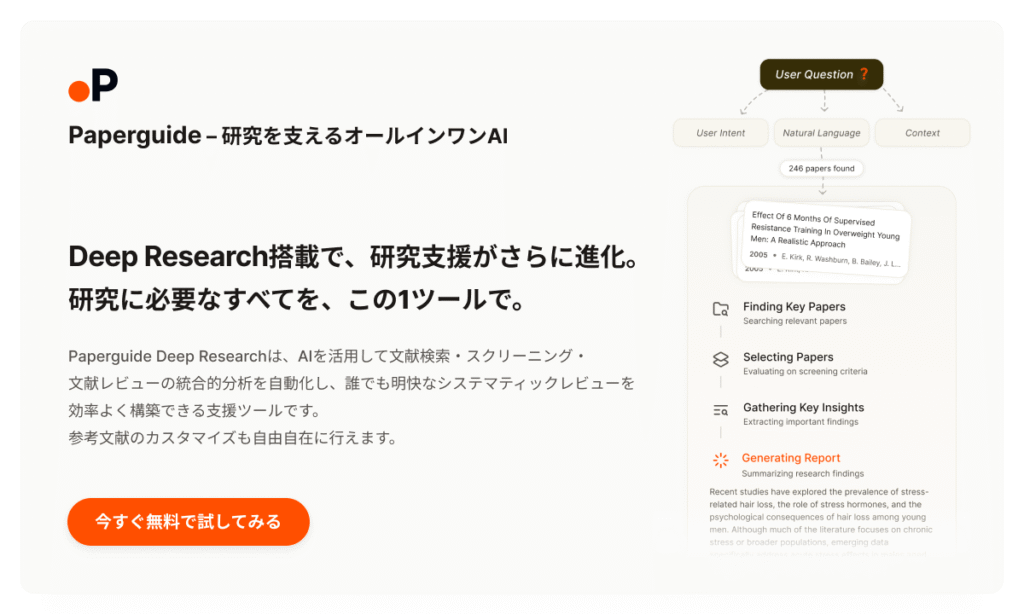A system to provide living and research expenses to outstanding young researchers (support organization:Japan Society for the Promotion of Science)
Can anyone be a JSPS Postdoctoral Fellow?"
How much do you get paid for being a Fellow?"
Fellowships are not only financial,Many graduate students and young researchers are seeking employment because of the performance benefits。
 Akanon
AkanonThis article provides a detailed explanation of the JSPS and Postdoctoral Fellowships.
Key points of this article
At the end of this article,How to Write an Accepted Application(for doctoral programs) are also described!
 Akanon
AkanonThe author's application for a difficult scholarship when he was a doctoral student is also available.
What is a JSPS Postdoctoral Fellowship?

What is a JSPS Postdoctoral Fellowship?
JSPS is the official name of the Japan Society for the Promotion of Science.
Among researchers and graduate students.JSPS Postdoctoral Fellowship."of theGakushinIt is often called
The purpose of the Fellowship is to foster and secure talented young researchers who will be responsible for Japan's future.
If selected, the student will receive support for research and living expenses.
It's like a system for people who want to become researchers.
 Akanon
AkanonBeing selected as a JSPS Postdoctoral Fellow by passing through the narrow gate is a sign of being an outstanding researcher.
Eligibility and Eligibility
There are different types of Gakushin: DC1, DC2, PD, and RPD.
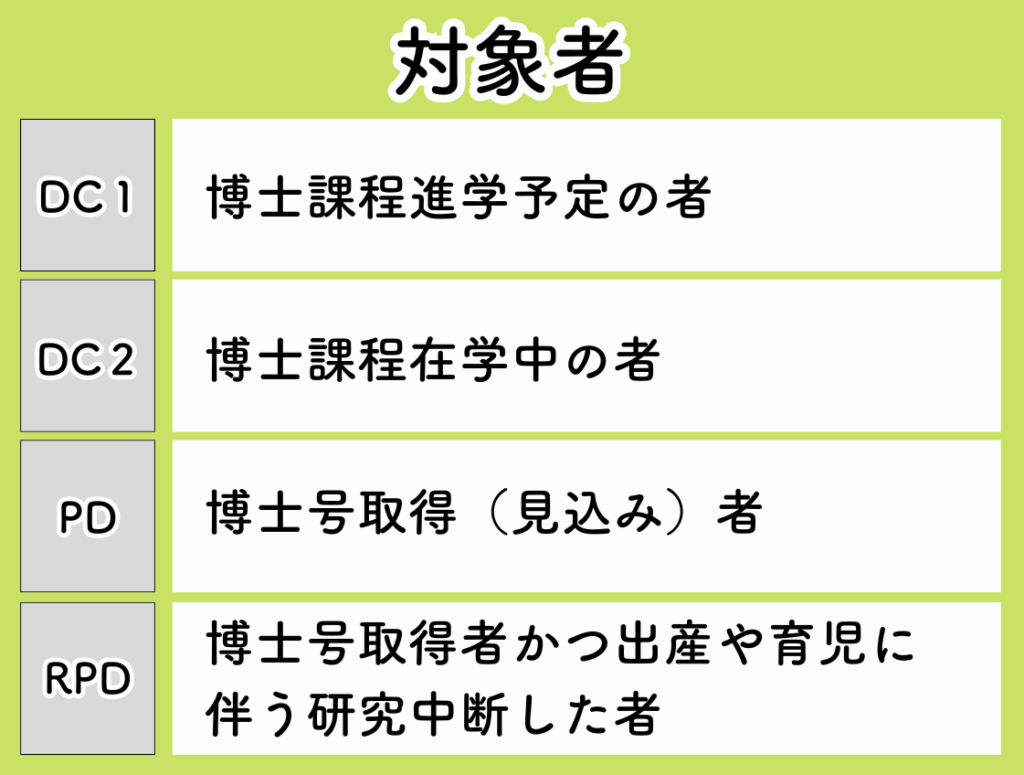
What happens if I get hired?
Upon acceptance, research and living expenses (research incentive) will be provided.
For example, DC1 and DC2 for doctoral students,2.4 million yen per year for living expenses and up to 1.5 million yen for research expenses。
While still a student, the 200,000 yen per month support allows students to greatly reduce part-time work and other expenses.
Check out the types of academic programs, support, and eligibility requirements.
Check the list.
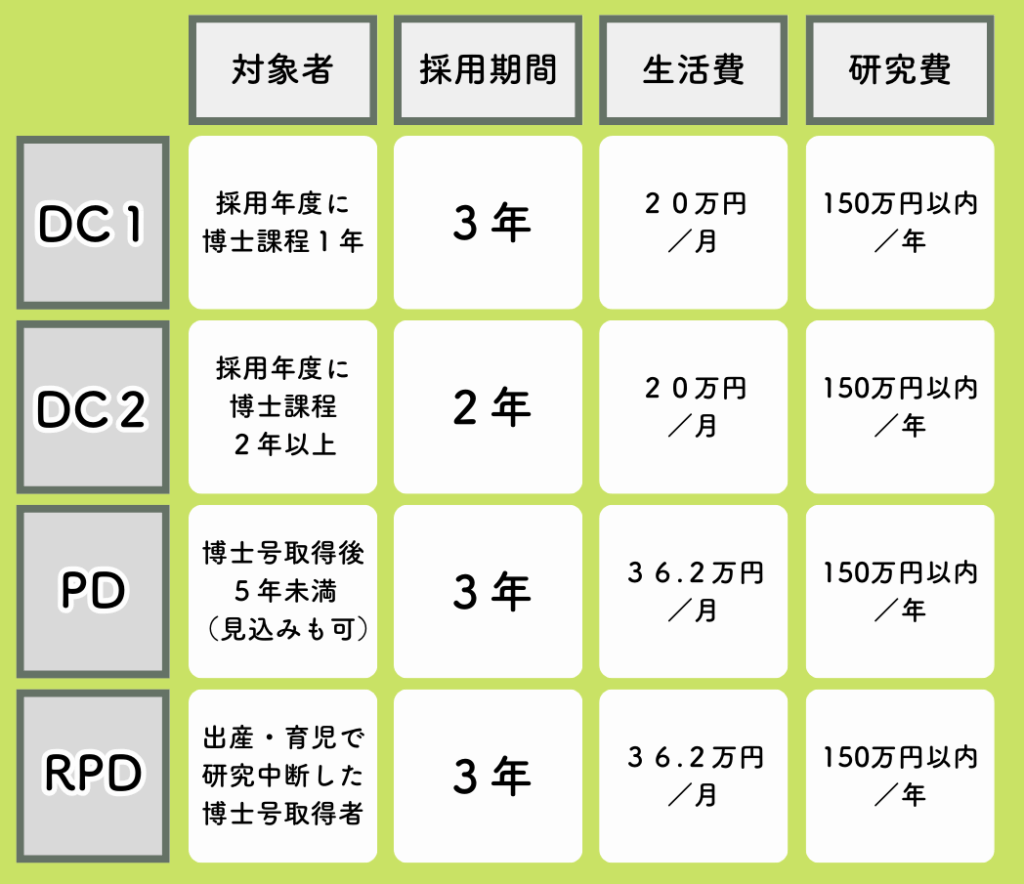
research funds (expenses)
You have stated that the research expenses are a flat amount of 1.5 million yen/year,Grant-in-Aid for Scientific Research (Grant-in-Aid for Young Scientists)The amount is determined on an individual basis by applying to the
And,Grants-in-Aid for Scientific Research (Funded)The grant will be issued as a

The amount of the grant determined by the above-mentioned categories, applied for by the applicant, will be used as the research grant.
The average allocation is 900,000 yen.
 Akanon
AkanonIn other words, the amount paid varies for each special researcher.
The average allocation is 900,000 yen.
For Doctoral Students] What are Special Researcher DC1 and DC2?
Postdoctoral Fellow DC1

The DC1 Postdoctoral Fellowships areSpecial Researchers who will be in the first year of a doctoral course in the year of appointmentof the
Application for JSPS is made in the second year of the master's program.
- Requirements: Applicants who will be in the first year of a doctoral program in the year of employment.
- Narrow recruitment rate of less than 20%.
- Employment period: 3 years
- Living expenses:200,000 yen/month
- Research Funds:Up to 1.5 million yen/year
For detailed eligibility requirements for DC1, click here.
Eligible persons: Those who will be in the first year of a doctoral course in the year of employment.
Those who are enrolled in a doctoral course at a graduate school in Japan as of April 1 of the year of employment and meet one of the following conditions
(including foreigners)
1. students enrolled in the equivalent of the first year of a doctoral course (less than 12 months of enrollment)
2. students enrolled in the equivalent of the third year of a doctoral program (24 months or more but less than 36 months of enrollment)
3. students enrolled in the equivalent of the first year of a doctoral course (less than 12 months of enrollment) in the second 3-year course only
4. students enrolled in the equivalent of the second year of a four-year doctoral course in medicine, dentistry, pharmacy, or veterinary medicine (enrolled for 12 to 24 months)
In the case of 1-3, those who are scheduled to enter the doctoral course in April of the year of employment are included.
If you have taken a leave of absence from the doctoral program after application, you may not be eligible to apply.
Postdoctoral Fellow DC2

The Special Researcher DC2 is a member of theSpecial Researchers who are in the second year of a doctoral course or above in the year of employmentof the
The program is open to those who are already doctoral students at the time of application and will be hired in the following academic year.
 Akanon
AkanonIf you fall into DC1, you still have a chance in DC2.
- Requirements: Applicants must be in the second year of a doctoral course or above in the year of employment.
- Narrow recruitment rate of less than 20%.
- Employment period: 2 years
- Living expenses:200,000 yen/month
- Research Funds:Up to 1.5 million yen/year
For detailed eligibility requirements for DC2, click here.
Eligible persons: Those who will be in the second year of a doctoral course or above in the year of employment.
Those who are enrolled in a doctoral course at a graduate school in Japan as of April 1 of the year of employment and meet one of the following conditions
(including foreigners)
1. those who are enrolled in the second or higher year of a doctoral course (12 months or more but less than 36 months).
2. students who are enrolled in the fourth or higher year of a doctoral program (36 months or more but less than 60 months).
3. those who are enrolled in the second or higher year of a doctoral course (12 months to 36 months of enrollment) for the second 3-year course only.
4. students enrolled in the third or higher year of a four-year doctoral course in medicine, dentistry, pharmacy, or veterinary medicine (between 24 and 48 months of enrollment)
If you have taken a leave of absence from the doctoral program after application, you may not be eligible to apply.
DC1 and DC2 areNo employment relationship with the host institutionThe JSPS grants are provided directly by the Japan Society for the Promotion of Science (JSPS).
Research grants provided for living expenses are taxable.
 Akanon
AkanonGet out of your parents' supportEnrollment in National Health Insurance is requiredIt is.
Also, please note that the program is generally not available in combination with other support programs.
Other Scholarships:Summary of scholarships and support information available for doctoral programs
What is a special researcher PD/RPD?
Postdoctoral Fellow PD

Program for those who have completed their Ph.
It can also be a connection until you get an academia position.
It is not a mere continuation of doctoral research, but rather a requirement to apply your abilities as a researcher in a new environment.
Therefore, the home institution from which you received (or will receive) your degreewith the exception ofThe condition is that you must place yourself in a research institute in
 Akanon
AkanonYou also have the advantage of being able to concentrate on your research rather than being employed in academia as a faculty member.
- Requirements: As of April 1 of the year of employment, the applicant must have obtained a doctoral degree less than 5 years ago (prospective applicants are also acceptable at the time of application).
- The number of recruits is approximately350 personsand very few
- Employment period is 3 years
- Living expenses:362,000 yen/month
- Research Funds:Up to 1.5 million yen/year
Postdoctoral Fellow RPD

An RPD is a researcher who receives support to return to research after an interruption in research due to childbirth or childcare.
You can choose the start of employment from April, July, October, or January so that you can choose when to return to work depending on your life situation.
<Special FellowshipRPD>
- Requirements: Those who have interrupted their studies due to childbirth or childcare.
- Small number of recruits but high adoption rate of more than 50%.
- Employment period is 3 years
- Living expenses:362,000 yen/month
- Research Funds:Up to 1.5 million yen/year
Click here for RPD's detailed eligibility requirements.
Eligibility: Persons who have earned a doctoral degree as of April 1 of the year of employment.
Any of the following
- Those who are raising a child of elementary school age or younger as of April 1 of the application year and who have interrupted their research activities for six weeks or more to give birth to or care for that child.
- Those who have interrupted their research activities for more than 6 weeks due to childbirth or medical treatment for a child with illness or disability.
- Those who have given birth (or plan to give birth) to a child after April 2 of the application year and before the application deadline, and who have interrupted or will interrupt their research activities for more than 6 weeks to care for the child.
Employment Relationship with Host Institution
Although the special researcher has not previously had an employment relationship with the host institution,2023Research Fellow PD and RPD fromCan be employed by the host institutionThe company is now in the process of
 Akanon
AkanonIn other words, the system has been improved so that employee pension and unemployment insurance are applied!
| conventional | R5 fiscal year onwards | |
|---|---|---|
| social status | Research Fellow of the Japan Society for the Promotion of Science (No employment relationship) | Staff of the host institution |
| Salaries, etc. | JSPS provides the grant as a "Research Fellowship". | 「salaryPaid by the host research institute as |
| Various allowances, etc. | nashi (Pyrus pyrifolia, esp. var. culta) | Commuting allowance, overtime allowance, etc. are provided. |
| public pension | national pension (Category 1 insured person) | welfare pension (Category 2 insured person) |
| health insurance | national health insurance | Health insurance by health insurance association, mutual aid association, etc. |
| unemployment insurance | nashi (Pyrus pyrifolia, esp. var. culta) | Applicable |
| Workers' Accident Compensation Insurance, etc. | Personal Accident Insurance (JSPS pays all expenses) | Applicable (The host institution pays all expenses.) |
| income tax | JSPS withholding tax | Withholding tax by the host institution |
| municipal tax | Payment by each person | Deducted from salary |
Changes in the number of applicants, hires, and adoption rates
How are the number of applicants and the adoption rate of the JSPS changing?
Let's compare based on data from the past five years.
Postdoctoral Fellow, DC1

| FY2020 | Fiscal Year 2021 | Fiscal Year 2022 | Fiscal Year 2023 | Fiscal Year 2024 | |
|---|---|---|---|---|---|
| Number of applicants | 3,711 | 3,582 | 3,824 | 3,991 | 4,591 |
| Number of Recruits | 721 | 731 | 707 | 691 | 694 |
| Adoption rate | 19.4 | 20.4 | 18.5 | 17.3 | 15.1 |
- The number of applicants has been increasing since FY2020
- Adoption rates are down.
Postdoctoral Fellow, DC2

| FY2020 | Fiscal Year 2021 | Fiscal Year 2022 | Fiscal Year 2023 | Fiscal Year 2024 | |
|---|---|---|---|---|---|
| Number of applicants | 5,654 | 5,728 | 5,833 | 5,860 | 6,367 |
| Number of Recruits | 1,094 | 1,132 | 1,094 | 1,086 | 1,091 |
| Adoption rate | 19.3 | 19.8 | 18.8 | 18.5 | 17.1 |
- The number of applicants has been increasing since FY2020
- Adoption rates are down.
 Akanon
AkanonThe difficulty level of Special Researcher DC1 and DC2 is increasing every year.
As for DC 1 and 2, I would like to see more people hired because the number of applicants is increasing.
However, in addition to the Gakusho, the government has also established various other support programs.
Other Scholarships:Summary of scholarships and support information available for doctoral programs
 Akanon
AkanonThe goal is to reach more than half of the doctoral students with state support.
Postdoctoral Fellow, PD

| FY2020 | Fiscal Year 2021 | Fiscal Year 2022 | Fiscal Year 2023 | Fiscal Year 2024 | |
|---|---|---|---|---|---|
| Number of applicants | 1,922 | 1,800 | 1,705 | 1,565 | 1,489 |
| Number of Recruits | 363 | 356 | 356 | 358 | 349 |
| Adoption rate | 19.6 | 19.8 | 20.9 | 22.9 | 23.4 |
- The number of applicants has been on a downward trend since FY2020
- Adoption rates are rising.
Postdoctoral Fellow, RPD
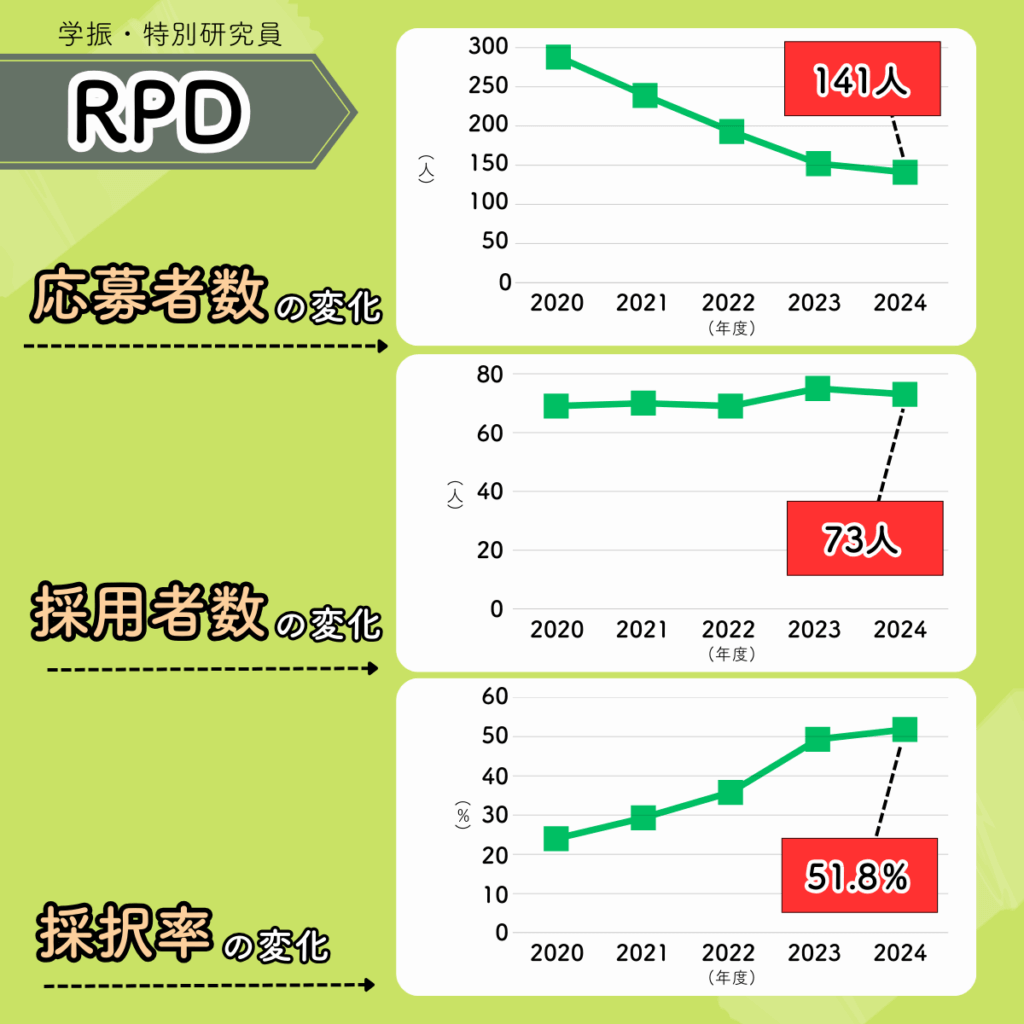
| FY2020 | Fiscal Year 2021 | Fiscal Year 2022 | Fiscal Year 2023 | Fiscal Year 2024 | |
|---|---|---|---|---|---|
| Number of applicants | 288 | 239 | 193 | 152 | 141 |
| Number of Recruits | 69 | 70 | 69 | 75 | 69 |
| Adoption rate | 24 | 29.3 | 35.8 | 49.3 | 48.9 |
- Small in scale to begin with.
- The number of applicants has been on a downward trend since FY2020
- Therefore, the adoption rate has increased significantly.
 Akanon
AkanonHighly recommended if you meet the application requirements.
Let's apply to Gakusho!
When and what kind of preparation is needed to apply for Gakusho?
Here is an explanation of the application timeline and process, as well as the documents required for the application.
Check early so that you do not miss the application period.
When and how to apply for Gakusho
The application timeline for DC1, DC2 and PD is as follows
Application guidelines published(February of the year prior to the year of hire)頃)
Application guidelines are released around February of the year prior to the hiring year.
For example, the application guidelines for the 2025 recruitment were published in February 2024.
Application Reception(April to June of the year prior to the year of hire)
Applications are accepted from April through early June.
First stage written screening (first round)(July-August of the year prior to the hiring year)
The first stage of written review will be conducted during July and August.
In the written review, six expert committee members evaluate the research plan comprehensively in terms of conception, originality, and qualifications as a researcher.
Second stage of written screening (second round)(August-September of the previous year of employment)
Another documentary review will be conducted for applicants who were in the border zone at the first stage of the review.
The border zone is those in between the top 16-24% of accepted and rejected applicants for a 20% adoption rate.
 Akanon
AkanonWe will re-examine those on the line who are unsure of their decision.
Disclosure of first round selection results(by early October of the year prior to the year of employment)
They are divided into three categories: "first round offerors," "second round offer candidates," and "rejectors."
 Akanon
AkanonFirst-time job applicants" will receive a job offer at this point.。
Disclosure of second round selection results(by early January of the year of employment)
The "Candidates for Secondary Selection Offer" in (5) will be disclosed separately as "Offerors", "Alternates", and "Rejects".
The "alternates" will be informed again by mid-February of their offer of employment or rejection.
employment decision (for job applicants)(April 1 of the fiscal year of employment)
After confirming the applicant's eligibility as of April 1, the applicant will be officially selected for employment.
Application Procedure and Required Documents
Applications are submitted through the electronic application system.
You will need to fill out about 10 pages, including research plan and evaluation, and it will take time for polishing, etc., so please work on it as soon as possible.
Application Process
- Confirmation of eligibility
- Issuance of ID/password for the electronic application system for the Researcher Training Program
- Entering Application Information
- Preparation of application forms
- Request for evaluation report
- Registration of application content file
- Submit application form
necessary documents
 Akanon
AkanonTwo types of documents are required.
- Application Form (Research Plan, etc.)← Quite difficult!
- Evaluation form (written by research supervisor; for PD, evaluation by host researcher after hiring is also required)
How to write an application (research plan, etc.)
<Research Plan Items
- Research Positioning
- Provide background on the situation and issues in the field, and how the plan was conceived.
- Purpose and Contents of Research
- Write down the purpose, methods, and contents of the research, mentioning also the unique and original aspects of the research.
- Reasons for Selection of Accepted Labs
- Describe the reasons for the selection of the host laboratory after employment, including the reasons for the selection and the advantages of the laboratory.
The content of your research plan is very important in order to win employment among the best researchers.
You must communicate your research plan in an attractive manner and convince the judges that you are a quality researcher.
When writing such a research proposal, you shouldElements that should not be removedThere are
The secret is summarized in the following NOTE.
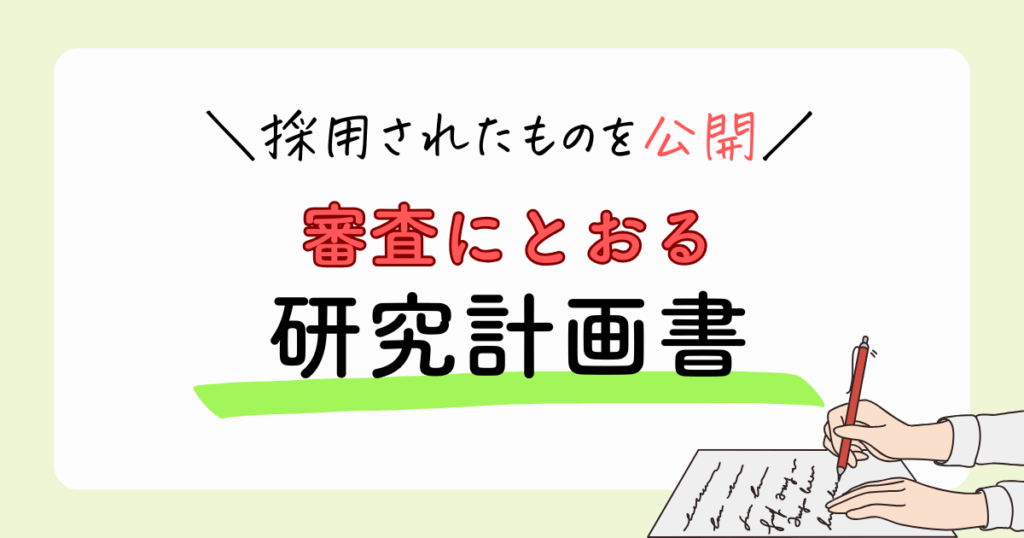
Selected for a difficult scholarship program.
The research plan is made publicly available,
The secrets of success and more are explained.
backslick / / click
Go to *note official page
 Akanon
AkanonThe author was actually selected for a difficult scholarship when he was a Ph.Research proposal publishedThe company is doing so.
Advantages of being employed by Gakusho
There are three advantages to being selected as a JSPS Postdoctoral Fellow
- Can afford to be financially secure.
- Secure research funds for your own use.
- Proud to be an achievement
The research incentive funds provided can be used to cover living expenses, reducing financial concerns.
 Akanon
AkanonYou can reduce the amount of time you devote to part-time work
(I know it's a little short on money...)
Also, by having my own personal research funding,Free use of research funds to pursue your own research interestsCan be done.
In addition, you will leave behind the achievement of being a special researcher with a high hiring rate, which will give you an advantage when you find a job or change jobs.
Thus, being selected as a JSPS Postdoctoral Fellow is beneficial both financially and in terms of performance.
summary
In this issue, we summarize the types, amounts, qualifications and methods of application for Gakusho's special research fellowships.
Key points of this article
Being selected as a JSPS Postdoctoral Fellow, which has both financial and performance benefits, will be a great advantage in your research life.
Make sure you have a well-developed research plan and appeal to the judges with a high-quality proposal.
We encourage you to apply.
 Akanon
AkanonThank you for reading to the end.
Article updates are also posted on X and Instagram.
Please follow us and check it out!
- click here
- Click here for the installation.
- Click here for YouTube (in preparation)
- Click here for NOTE
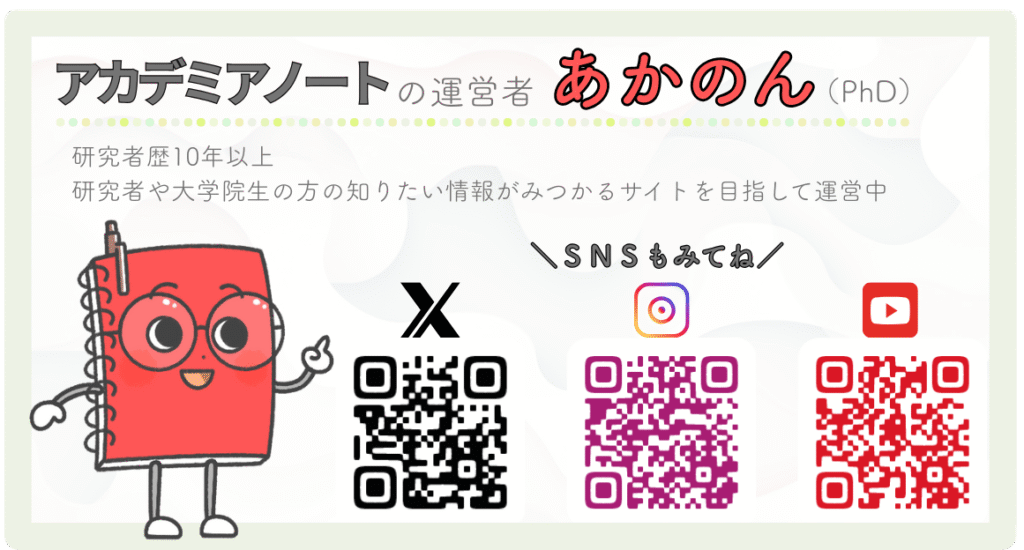
request
Thank you for taking the time to read this article.
This is a personal site that the operator updates little by little in between his personal life.
If you found the content of this site helpful,
We would be happy to receive feedback on social networking sites.
The feedback we receive will encourage us to create future articles.

